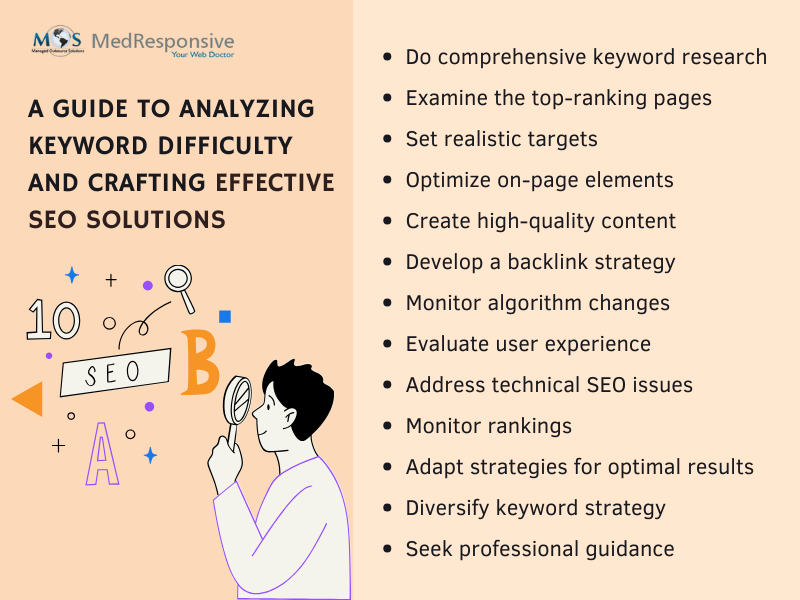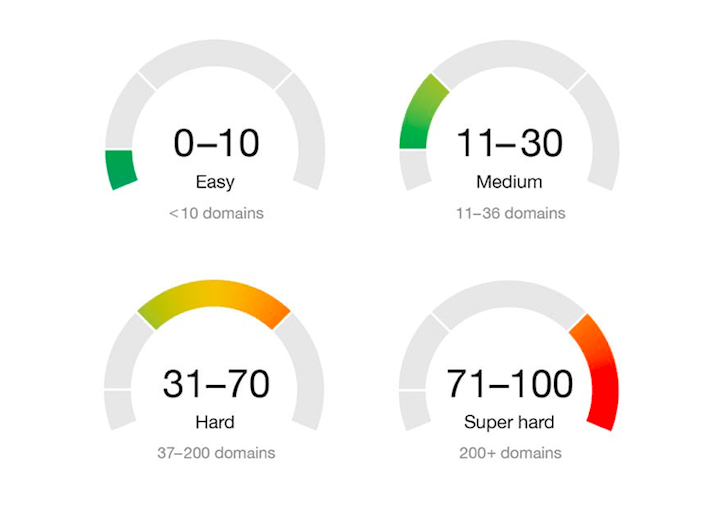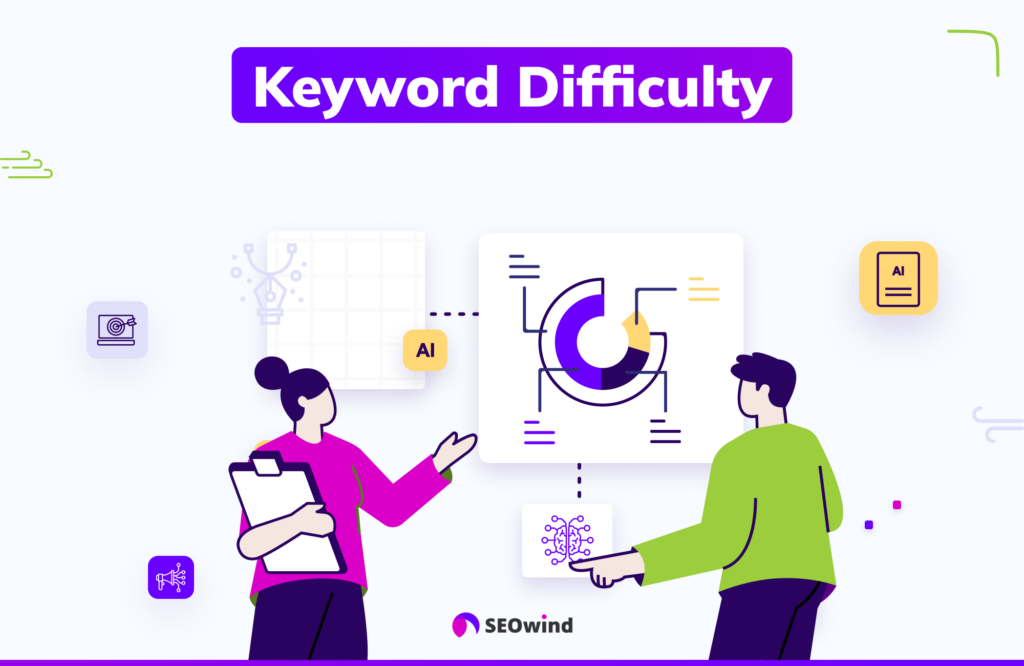Unlock the secrets to understanding keyword difficulty and drive targeted traffic to your website with this comprehensive guide now.

Image courtesy of via DALL-E 3
Table of Contents
- Introduction to Keyword Difficulty
- Understanding Search Engine Optimization (SEO)
- Factors Influencing Keyword Difficulty
- Tools for Measuring Keyword Difficulty
- Choosing the Right Keywords
- Monitoring Your Keyword Performance
- Adjusting Your Keyword Strategy
- Common Mistakes to Avoid
- Summary and Takeaways
- Frequently Asked Questions (FAQs)
Introduction to Keyword Difficulty
In the vast landscape of the internet, where billions of websites compete for attention, SEO plays a crucial role in determining who gets the spotlight. But what exactly is Keyword Difficulty and why should beginners like you care about it?
What is Keyword Difficulty?
Keyword Difficulty is like a measuring stick that tells us how hard or easy it is to rank for a specific keyword in search engine results. In simple terms, it helps us understand the level of competition we face when trying to get our website to appear on the coveted first page of Google or other search engines.
Why Should You Care?
Imagine you have a lemonade stand. You want to attract as many thirsty customers as possible. Well, in the online world, keywords are like the signs you put up to attract visitors to your stand. The higher the Keyword Difficulty, the more challenging it is to get noticed amidst all the other lemonade stands (websites).
By understanding Keyword Difficulty, you can pick the right keywords that are not too hard to rank for, but still popular enough to bring you visitors. This way, you can increase the chances of your website showing up on search engines and welcoming more visitors to your virtual lemonade stand.
Understanding Search Engine Optimization (SEO)
SEO stands for Search Engine Optimization. It’s like giving clues to search engines, such as Google, to help them understand what your website is about. By using the right clues (keywords), you can get more people to visit your site.
How Search Engines Work
Imagine search engines like big libraries where you type in a question, and they quickly find the best books (websites) for you. They look at things like keywords, how popular a book is (website traffic), and how well the book is organized (SEO).
Keywords and Their Role in SEO
Keywords are like secret codes that tell search engines what your website is all about. If you use the right keywords, search engines can match your site with what people are looking for. It’s like a magical key that opens the door to your website!
Factors Influencing Keyword Difficulty
In the world of SEO, the difficulty of a keyword can greatly impact your website’s search engine ranking. Several key factors influence the level of difficulty associated with a keyword, ultimately affecting your SEO strategy and website traffic. Let’s delve into these factors to better understand how they shape keyword difficulty.

Image courtesy of www.medresponsive.com via Google Images
Competition
Competition plays a significant role in determining the difficulty of a keyword. When many websites are vying for the same keyword, it becomes harder to rank high in search engine results. The more competitive a keyword is, the more effort and time it may take to achieve a favorable ranking.
Search Volume
Search volume refers to the number of times a specific keyword is searched for within a given period. High search volume keywords are often more competitive, while low search volume keywords may be easier to rank for. Understanding the search volume of a keyword can help you gauge its difficulty and adjust your strategy accordingly.
Relevance to Your Content
Choosing keywords that are closely related to your content and align with your target audience is crucial. Search engines prioritize relevant content, so selecting keywords that accurately reflect the essence of your website can improve your chances of ranking higher. Ensuring relevance between your keywords and content can positively impact your SEO efforts.
Tools for Measuring Keyword Difficulty
In order to effectively evaluate keyword difficulty and make informed decisions for your SEO strategy, it’s essential to leverage various tools designed to measure this crucial metric accurately. These tools can provide valuable insights into the competitiveness and search volume of specific keywords, helping you choose the most strategic targets for your content.
Popular Keyword Research Tools
There are several popular keyword research tools available that can assist you in determining the difficulty of your chosen keywords. One such tool is the Google Keyword Planner, which offers valuable data on search volume and competition levels for different keywords. Ahrefs and SEMrush are also widely used tools that provide comprehensive keyword analysis, including difficulty scores and competitor insights.
How to Use These Tools
When using these tools, start by entering your target keyword or phrase to generate a list of related keywords along with their difficulty scores. These scores typically range from 0 to 100, with higher values indicating greater competition. Aim for keywords with moderate difficulty scores that strike a balance between achievability and potential rewards.
Choosing the Right Keywords
When it comes to improving your website’s visibility on search engines like Google, choosing the right keywords is essential. Keywords are the terms and phrases that people type into search engines when looking for information. To attract more visitors to your website, you need to select keywords that have low competition but high potential. Here are some tips and strategies to help you choose the right keywords for your SEO goals.

Image courtesy of www.dashclicks.com via Google Images
Balancing Difficulty and Rewards
It’s important to find a balance between keyword difficulty and the potential rewards of ranking for that keyword. While targeting highly competitive keywords may seem appealing, it can be challenging to rank for them, especially if your website is new or doesn’t have a strong domain authority. On the other hand, targeting keywords with very low competition but little search volume may not bring the desired traffic to your site. Aim for keywords that strike the right balance – they should be relevant to your content, have a moderate level of competition, and offer potential for driving quality traffic to your site.
Targeting Long-tail Keywords
Long-tail keywords are longer, more specific phrases that people use when they are closer to making a purchase or seeking specific information. These keywords are often easier to rank for because they have lower competition and higher conversion rates. For example, instead of targeting a broad term like “shoes,” you could target a long-tail keyword like “women’s running shoes with arch support.” By focusing on long-tail keywords that are highly relevant to your content, you can attract more qualified visitors to your site who are more likely to convert into customers or subscribers.
Monitoring Your Keyword Performance
Once you’ve selected your target keywords and implemented them into your content, it’s crucial to monitor their performance to ensure your SEO strategy is on track. Tracking your keywords allows you to see how well they are performing and identify areas for improvement.
Using Analytics Tools
Google Analytics and Google Search Console are powerful tools that can help you monitor your keyword performance. Google Analytics provides valuable metrics such as organic search traffic, bounce rate, and conversion rate, while Google Search Console gives insights into how your site is performing in Google search results.
Interpreting Results
When tracking your keyword performance, it’s essential to understand the data and metrics you’re presented with. Look at trends over time to see if your rankings are improving or declining. Pay attention to which keywords are driving the most traffic to your site and which ones may need optimization.
By analyzing the results from these tools, you can gain valuable insights into how your keywords are performing and make informed decisions about your SEO strategy moving forward.
Adjusting Your Keyword Strategy
In the world of SEO, your keyword strategy is not set in stone. It requires constant evaluation and adjustment to stay effective. Here are some tips on how to refine your keyword approach.

Image courtesy of www.wordstream.com via Google Images
When to Change Your Keywords
It’s essential to keep an eye on how your current keywords are performing. If you notice that certain keywords are not generating the desired results, it might be time to switch them up. Pay attention to metrics like search volume, click-through rates, and conversion rates to identify underperforming keywords.
Incorporating New Trends
SEO trends are always evolving, and it’s crucial to stay up-to-date with the latest developments. Keep an eye on emerging keywords related to your industry or niche and incorporate them into your strategy. By staying current with trends, you can stay ahead of the competition and reach new audiences.
Common Mistakes to Avoid
One common mistake many people make when evaluating keyword difficulty is overlooking the competition. It’s not just about how popular a keyword is, but also how many other websites are trying to rank for it. Ignoring the competitive landscape can lead to targeting keywords that are too difficult to rank for, wasting time and resources.
Ignoring Relevance
Another crucial mistake to avoid is ignoring the relevance of your chosen keywords. It’s essential to select keywords that are closely related to your content and align with what your audience is searching for. Choosing generic keywords that are not relevant to your website can result in high bounce rates and low engagement, impacting your overall SEO performance.
Focusing Only on High Volume
While high search volume keywords may seem appealing, focusing solely on them can be a mistake. A keyword with high search volume may also have high competition, making it challenging to rank for. It’s important to strike a balance between search volume and competition when selecting keywords to target. Opting for long-tail keywords with lower search volume but less competition can often yield better results in the long run.
Summary and Takeaways
In this article, we have explored the concept of Keyword Difficulty and its crucial role in SEO (Search Engine Optimization). By understanding how to evaluate keyword difficulty, you can make better decisions to target the right keywords and improve your website’s search engine rankings. Let’s recap the key points discussed and emphasize the importance of this knowledge.

Image courtesy of seowind.io via Google Images
Recap of Key Points
We began by defining what Keyword Difficulty is and why it matters for SEO. This metric helps you assess how tough it will be to rank for a specific keyword, guiding your targeting efforts effectively.
Next, we delved into the factors that influence keyword difficulty, including competition, search volume, and relevance to your content. Understanding these factors is vital in choosing the right keywords to optimize for.
We also introduced various Tools for Measuring Keyword Difficulty, such as Google Keyword Planner, Ahrefs, and SEMrush, which can assist you in analyzing keyword difficulty scores and making informed decisions.
Furthermore, we provided tips on Choosing the Right Keywords by balancing difficulty with potential rewards and targeting Long-tail Keywords that offer a more achievable and rewarding strategy.
We discussed the importance of Monitoring Your Keyword Performance using tools like Google Analytics and Search Console to track your SEO results and interpret the data to enhance your keyword strategy.
Lastly, we highlighted the significance of Adjusting Your Keyword Strategy based on performance data and evolving SEO trends and identified Common Mistakes to avoid in evaluating keyword difficulty.
Final Thoughts
Understanding Keyword Difficulty is a fundamental aspect of successful SEO strategies. By continuously assessing, refining, and adjusting your keyword targeting efforts, you can enhance your website’s visibility and attract more organic traffic. Remember, staying updated with SEO trends and avoiding common pitfalls will contribute to optimizing your keyword strategy effectively. Keep learning and adapting to the changing landscape of search engine algorithms to achieve your SEO goals!
Want to turn these SEO insights into real results? Seorocket is an all-in-one AI SEO solution that uses the power of AI to analyze your competition and craft high-ranking content.
Seorocket offers a suite of powerful tools, including a Keyword Researcher to find the most profitable keywords, an AI Writer to generate unique and Google-friendly content, and an Automatic Publisher to schedule and publish your content directly to your website. Plus, you’ll get real-time performance tracking so you can see exactly what’s working and make adjustments as needed.
Stop just reading about SEO – take action with Seorocket and skyrocket your search rankings today. Sign up for a free trial and see the difference Seorocket can make for your website!
Frequently Asked Questions (FAQs)
What is the best tool for measuring keyword difficulty?
When it comes to measuring keyword difficulty, there are several reliable tools available to assist you. Some popular options include Google Keyword Planner, Ahrefs, and SEMrush. Each tool has its own unique features and capabilities that can help you determine the difficulty of keywords and guide your targeting decisions. It’s recommended to explore these tools and find one that best suits your needs and preferences.
Can I target high difficulty keywords?
Targeting high difficulty keywords can be both challenging and rewarding. While these keywords often have a lot of competition, ranking for them can significantly boost your website’s visibility and traffic. It’s essential to weigh the pros and cons before deciding to target high difficulty keywords. Consider your resources, the competitiveness of your niche, and the potential benefits of ranking for those keywords. Sometimes, it might be more beneficial to focus on lower difficulty keywords that are still relevant to your content and audience.
How often should I update my keyword strategy?
Updating your keyword strategy regularly is crucial for maintaining and improving your SEO performance. It’s recommended to revisit your keyword strategy at least every few months to analyze your performance data, identify any trends or patterns, and adjust your targeting accordingly. By monitoring your keyword performance and staying updated on industry trends, you can ensure that your strategy remains effective and aligned with your SEO goals.







